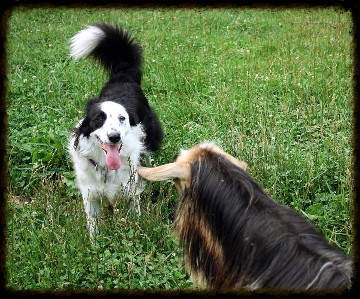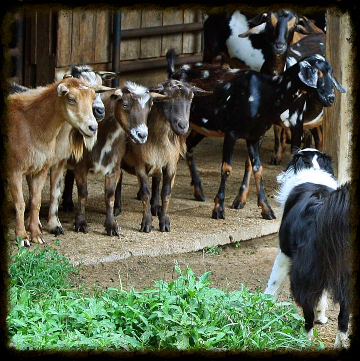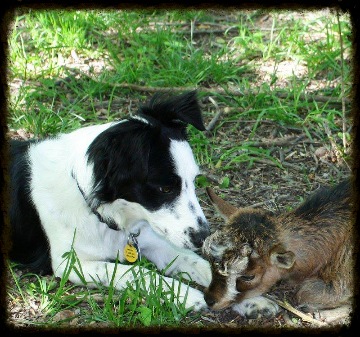by Janet Shlanta @2015
Our adventure with goats began in 1998 with the purchase of two adorable Nigerian Dwarf does. It was the modest beginnings of what would become a goat “addiction”. Over the years, the herd has grown with the addition of Nubians, Mini Nubians and Miniature Silky Fainting goats. I love each breed and they all have their own unique characteristics, but my personal favorites have always been the girls that I milk…the Nubians and Mini Nubians (a breed developed from a cross between Nubians and Nigerians). I really enjoy their quirky personalities and openly affectionate attitudes. When you milk goats, there is a special bond that develops between you and your does; and they always let you know when it’s time to be milked. (Nubians are well known for their vocalizations!) And of course, there is that delicious fresh goat milk and cheese. Goat milk can vary quite a bit by breed, with the Nubian and Mini Nubian milk having a  higher percentage of butterfat than some of the other breeds, which makes for a sweet tasting milk and wonderful cheese.
higher percentage of butterfat than some of the other breeds, which makes for a sweet tasting milk and wonderful cheese.
Raising goats is very rewarding, but can also be challenging at times, and having good help is a “must”. A typical day consists of the morning and evening milking, feeding and watering, raking the barn, and scanning the herd to make sure that everyone is doing well. My best helper comes in the form of my English Shepherd, Iris (pictured in this article), who makes the rounds with me every day. Her main job is guardian of the gates, as I pass through with armloads of hay. She particularly loves it when one of the older, pushy girls gets out of line and tries to slip through. Iris doesn’t hesitate to show her who’s boss and puts her back in her place. She is small, but tenacious, and is always ready to help whenever I need her. Sometimes though, Iris does offer her opinion on goat management whether I ask for it or not…for better or for worse. In the end, we are always partners. She is nearly three years old and we are still learning how best to work together.
Every few months, we have a herd maintenance day. This is when I trim hooves and de-worm or vaccinate anyone who might need it. Of course this involves outsmarting a few of the more savvy goats, who would rather not be part of this exercise. Somehow they always seem to know that something is up, and try to give me a run for the money. This is when Iris really “turns on.” It didn’t take her very long to learn who the stubborn ones were. She relishes the challenge of getting them into the barn and doesn’t give up until every one of those troublemakers is where they belong. She is super quick and agile, which really comes in handy when a belligerent goat decides to turn and butt. Having her help has saved me so much time and energy. Tthe best part is, she really thrives on it!
of the more savvy goats, who would rather not be part of this exercise. Somehow they always seem to know that something is up, and try to give me a run for the money. This is when Iris really “turns on.” It didn’t take her very long to learn who the stubborn ones were. She relishes the challenge of getting them into the barn and doesn’t give up until every one of those troublemakers is where they belong. She is super quick and agile, which really comes in handy when a belligerent goat decides to turn and butt. Having her help has saved me so much time and energy. Tthe best part is, she really thrives on it!
Then there is kidding season. We don’t breed many goats these days, as most of our does are “retired”, so each batch of kids is even more special. It’s hard to find words to describe the miracle of seeing these baby goats being born. Most often the dams do just fine, but  there are also those nerve wracking times when they need some help. It is a huge and humbling responsibility. The pleasure of seeing these new kids find their legs and do their first “happy dance” is so worth it. Iris has always loved the babies, even as a young pup. Now that she’s older and has become the goat “enforcer,” we take the introductions to new babies slowly until the dams trust that their babies will be safe with her. Iris seems to have this natural instinct that babies are helpless and require gentleness and protection. She loves watching over her young charges. On more than one occasion she has alerted me to a little one caught in a feeder or separated from his dam. She always seems to sense when someone is out of place or in trouble. Iris is the best little companion and helper ever. I can’t imagine being without her. She is our first English Shepherd and we are so lucky to have her in our lives.
there are also those nerve wracking times when they need some help. It is a huge and humbling responsibility. The pleasure of seeing these new kids find their legs and do their first “happy dance” is so worth it. Iris has always loved the babies, even as a young pup. Now that she’s older and has become the goat “enforcer,” we take the introductions to new babies slowly until the dams trust that their babies will be safe with her. Iris seems to have this natural instinct that babies are helpless and require gentleness and protection. She loves watching over her young charges. On more than one occasion she has alerted me to a little one caught in a feeder or separated from his dam. She always seems to sense when someone is out of place or in trouble. Iris is the best little companion and helper ever. I can’t imagine being without her. She is our first English Shepherd and we are so lucky to have her in our lives.